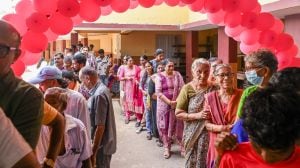It’s for democratically elected govt to decide on renaming of places: SC
The bench, also comprising Justice J B Pardiwala, declined to entertain the plea noting that a similar petition is pending before the Bombay High Court.
 Upadhyay sought permission to withdraw his petition and approach the government, but the court said it did not want to give him that relief either. "Let us not break society with such kinds of petitions, please have the country in mind, not any religion”.
Upadhyay sought permission to withdraw his petition and approach the government, but the court said it did not want to give him that relief either. "Let us not break society with such kinds of petitions, please have the country in mind, not any religion”.
The Supreme Court Wednesday said it is for a democratically elected government to decide on renaming places.
“Whether we like it or not, these (matters) lie in the democratic realm of the government. Who are we to change the name of a road or a place? It is for the elected executive to decide,” Chief Justice of India DY Chandrachud, presiding over a two-judge bench, remarked while hearing a plea challenging the renaming of Aurangabad in Maharashtra as Chatrapati Sambhaji Nagar.
The bench, also comprising Justice J B Pardiwala, declined to entertain the plea noting that a similar petition is pending before the Bombay High Court.
On February 27 this year, a two-judge bench of the Supreme Court had frowned upon a petition which sought directions to restore the names of places changed by “foreign barbaric invaders” and dismissed it saying “a country cannot remain a prisoner of the past” and that the “court should not be made an instrument to create havoc.” The bench of Justices K M Joseph and B V Nagarathna even rejected his prayer to allow him to withdraw the petition and give a representation to the government.
The bench then had said that one cannot revisit history “selectively” and that there is no space for bigotry in Hinduism, but the counsel sought to remind that the benevolent nature of Hinduism had resulted in it being wiped out from places like Afghanistan and Pakistan and Hindus being reduced to a minority in seven states even in India.
“You want to keep this issue alive and keep the country on the boil? If fingers are pointed at a particular community…You run down a particular section of society. India is a secular state, this is a secular forum,” Justice Joseph had said.
Justice Nagarathna too did not approve the petition and remarked: “Hinduism is a way of life. Because of that India has assimilated everybody. Because of that we are able to live together”. The judge sought to remind that “divide and rule policy of the British brought about schism in our society” and told Upadhyay, “let us not bring that back…”.
Upadhyay sought permission to withdraw his petition and approach the government, but the court said it did not want to give him that relief either. “Let us not break society with such kinds of petitions, please have the country in mind, not any religion”.







